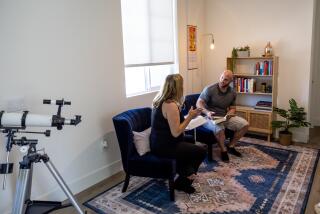SROs Fill Vital Housing Role
- Share via
Single-room residential hotels are not the sexiest topic around, whether the conversation is about attaining the proper mix for San Diego’s blossoming downtown or about how to aid the homeless. In the minds of many, the SROs, as they are commonly called, are only slightly above the stereotypical old flop houses.
In reality, however, SROs occupy an important niche in the city’s housing stock and some attention must be paid to seeing that there is a sufficient supply of them. SROs are rooms typically occupied by low-income people and that rent for $200 to $400 a month. The city Housing Commission estimates there is a need for 5,000 SRO units, but about 1,200 have been demolished in the past decade leaving only about 3,500.
A City Council committee recently approved a group of 25 recommendations aimed at maintaining the existing 65 residential hotels and encouraging the construction of new ones. The committee rejected, however, the most controversial recommendation by the Housing Commission. That would have required the owners of residential hotels to provide new SRO rooms if they wanted to raze their buildings or change their uses.
The committee concluded--properly, we think--that such a requirement would have been a disincentive to improving older buildings and would have imposed an undue burden on property owners.
The recommendations the committee approved, if adopted by the full council, would remove antiquated portions of the city building code, making it easier for residential hotel owners to remodel their properties. They also sent a message to the Housing Commission that it should give priority to developing new SRO facilities either through public ownership or in conjunction with private developers.
One set of developers already has taken the plunge into the SRO market. The first SRO hotel to be built in 73 years, the Baltic Inn, on Sixth Avenue south of Martin Luther King Way, is scheduled to open in the spring. Built in part with a $500,000 low-interest loan from the Housing Commission, it will have 207 rooms. If it proves successful, it should encourage others to enter the field.
The need for SROs is growing from two different groups of people. On one hand are those who are on modest, fixed incomes who are moving down the economic ladder and struggling to maintain some type of residence. On the other, are low-income working people either not yet able to afford apartments or who want to live near their jobs downtown.
The full council should adopt the SRO package when it takes it up next month. Then it should monitor closely the effect the recommendations have and make sure the situation is improving and not continuing to slip.
More to Read
Sign up for Essential California
The most important California stories and recommendations in your inbox every morning.
You may occasionally receive promotional content from the Los Angeles Times.






